
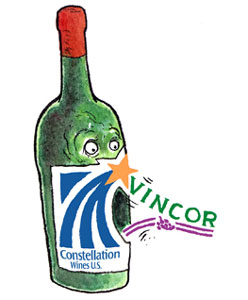
What seemed to be a savoury acquisition for Constellation turned out to be an indigestible morsel.
British Columbia (Provincial Appellation)
Vincor’s remarkable rejection of a hostile takeover
Constellation must have believed that Vincor would be an easy takeover… Such a widely-held company is usually low-hanging fruit to a hostile suitor.
by
John Schreiner
December 15, 2005
Wine producer Vincor International Inc.’s refusal to be swallowed by Constellation Brands Inc, the world’s largest wine company, was a surprising show of corporate hardball.
It also reflected a vote of confidence in Vincor’s management and current direction by its shareholders, the majority of whom are mutual funds and pension funds. These shareholders turned down certain capital gains, a highly unusual performance from institutional investors who almost always take the bird in hand rather than gambling that there are two in the bushes.
Apparently, the institutional shareholders agreed with management that Vincor is worth more that Constellation was prepared to pay. That was a remarkable conclusion, since no competing bid ever emerged to top Constellation. Normally, that would suggest that Constellation’s offer was financially reasonable. It was more than gutsy for Vincor’s management and shareholders to stand their ground.
While this may not be the last word in this matter, the outcome so far can be seen to be positive for the Canadian wine industry.
Constellation is a mammoth company based in New York state, with annual sales of more than US$5 billion. It became the largest wine company in the world after acquiring Australia’s BRL Hardy group two years ago and California’s Robert Mondavi last year. In addition to those brands, it owns or controls Ravenswood, Simi, Estancia and Franciscan, just to cite a few of its properties that are familiar to wine consumers.
At the end of September, it offered $31 a share (later raised to $33 and perhaps to $35) for Vincor. The Canadian company’s shares, which had traded as high as $30 in July, swooned to $22 in early September, after Vincor reported a bad quarter. Constellation saw this as a buying opportunity, figuring that most Vincor shareholders would welcome a bid that was a premium on that depressed value.
The Canadian company’s shares, which had traded as high as $30 in July, swooned to $22 in early September, after Vincor reported a bad quarter. Constellation saw this as a buying opportunity, figuring that most Vincor shareholders would welcome a bid that was a premium on that depressed value.
The bump in the road that derailed the company’s share price and attracted Constellation’s bid was caused by the world’s wine surplus -- especially Australian and French wine surpluses. Value-priced brands like Kumala (a South African brand Vincor owns) are running into tough competition, particularly in the big British market.
Vincor is Canada’s largest wine producer and the eighth largest in the world. Its sales in the 2005 fiscal year totalled $653.9 million.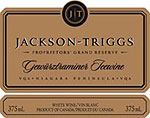
Like Constellation, Vincor has grown, at least in part, by consolidating. It emerged in 1989 when a management group under Donald Triggs, still Vincor’s chief executive, bought the Chateau-Gai winery assets from brewer John Labatt. Over the next several years, this group merged with Inniskillin and took over T.G. Bright & Co., then Canada’s oldest winery. That collection of companies was transformed into Vincor. It offers its face to consumers in Canada primarily under the Jackson-Triggs brand, launched in 1994.
During the decade, Vincor has put together a good collection of winery assets in Canada and elsewhere.
Constellation must have believed that Vincor would be an easy takeover. The directors and the officers control only 4.2% of the shares. The single largest shareholder is a mutual fund management group holding only 11% per Vincor’s 35.5 million shares. Such a widely-held company is usually low-hanging fruit to a hostile suitor.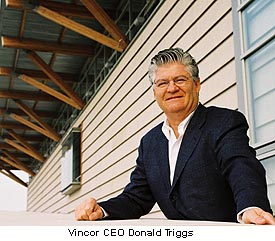
Vincor’s directors, however, told Constellation that it would not have access to Vincor’s inside information until more money was put on the table. It was implied that a minimum of $36 a share was required to unlock that sensitive information.
It would be premature to conclude that Vincor slammed the door for all time against a takeover. The directors’ refusal was less than an unequivocal rejection since it set a minimum value for the company. Someone just may put more money in the table one day.
One can only speculate what Constellation would have done with Vincor’s assets. In the case of Mondavi, Constellatio
It also reflected a vote of confidence in Vincor’s management and current direction by its shareholders, the majority of whom are mutual funds and pension funds. These shareholders turned down certain capital gains, a highly unusual performance from institutional investors who almost always take the bird in hand rather than gambling that there are two in the bushes.
Apparently, the institutional shareholders agreed with management that Vincor is worth more that Constellation was prepared to pay. That was a remarkable conclusion, since no competing bid ever emerged to top Constellation. Normally, that would suggest that Constellation’s offer was financially reasonable. It was more than gutsy for Vincor’s management and shareholders to stand their ground.
While this may not be the last word in this matter, the outcome so far can be seen to be positive for the Canadian wine industry.
Constellation is a mammoth company based in New York state, with annual sales of more than US$5 billion. It became the largest wine company in the world after acquiring Australia’s BRL Hardy group two years ago and California’s Robert Mondavi last year. In addition to those brands, it owns or controls Ravenswood, Simi, Estancia and Franciscan, just to cite a few of its properties that are familiar to wine consumers.
At the end of September, it offered $31 a share (later raised to $33 and perhaps to $35) for Vincor.
 The Canadian company’s shares, which had traded as high as $30 in July, swooned to $22 in early September, after Vincor reported a bad quarter. Constellation saw this as a buying opportunity, figuring that most Vincor shareholders would welcome a bid that was a premium on that depressed value.
The Canadian company’s shares, which had traded as high as $30 in July, swooned to $22 in early September, after Vincor reported a bad quarter. Constellation saw this as a buying opportunity, figuring that most Vincor shareholders would welcome a bid that was a premium on that depressed value.
The bump in the road that derailed the company’s share price and attracted Constellation’s bid was caused by the world’s wine surplus -- especially Australian and French wine surpluses. Value-priced brands like Kumala (a South African brand Vincor owns) are running into tough competition, particularly in the big British market.
Vincor is Canada’s largest wine producer and the eighth largest in the world. Its sales in the 2005 fiscal year totalled $653.9 million.

Like Constellation, Vincor has grown, at least in part, by consolidating. It emerged in 1989 when a management group under Donald Triggs, still Vincor’s chief executive, bought the Chateau-Gai winery assets from brewer John Labatt. Over the next several years, this group merged with Inniskillin and took over T.G. Bright & Co., then Canada’s oldest winery. That collection of companies was transformed into Vincor. It offers its face to consumers in Canada primarily under the Jackson-Triggs brand, launched in 1994.
During the decade, Vincor has put together a good collection of winery assets in Canada and elsewhere.
-
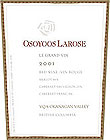 In 1996, it purchased Okanagan Vineyards near Oliver, transforming it into Inniskillin Okanagan. That property’s Dark Horse Vineyard is one of the top Cabernet Sauvignon sites in the Okanagan.
In 1996, it purchased Okanagan Vineyards near Oliver, transforming it into Inniskillin Okanagan. That property’s Dark Horse Vineyard is one of the top Cabernet Sauvignon sites in the Okanagan. - In 1998, it launched a joint venture with a Bordeaux producer to create Osoyoos Larose. That venture has now released three vintages of an increasingly superb Bordeaux-style red wine. Shortly after this venture was started, a similar one was formed in Ontario, called Le Clos Jordanne, in partnership with a Burgundy wine producer. Le Clos has just begun releasing its wines.
- In 2000, it purchased Sumac Ridge Estate Winery and Hawthorne Mountain Vineyards, two of the Okanagan’s solid estate wineries.
- In 2000 Vincor acquired Dunnigan Hills producer, R.H. Phillips. That was the first of a succession of winery acquisitions for Vincor south of the border and overseas. Washington State’s Hogue Cellars was purchased in 2001; Australia’s Goundrey in 2002. Amberley Estate, a second Australian winery, and Kim Crawford of New Zealand were purchased in 2003. In 2004, Vincor bought Western Wines, a British company that controls a leading South African wine brand, Kumala.
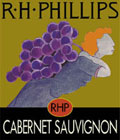
Constellation must have believed that Vincor would be an easy takeover. The directors and the officers control only 4.2% of the shares. The single largest shareholder is a mutual fund management group holding only 11% per Vincor’s 35.5 million shares. Such a widely-held company is usually low-hanging fruit to a hostile suitor.

Vincor’s directors, however, told Constellation that it would not have access to Vincor’s inside information until more money was put on the table. It was implied that a minimum of $36 a share was required to unlock that sensitive information.
It would be premature to conclude that Vincor slammed the door for all time against a takeover. The directors’ refusal was less than an unequivocal rejection since it set a minimum value for the company. Someone just may put more money in the table one day.
One can only speculate what Constellation would have done with Vincor’s assets. In the case of Mondavi, Constellatio












